The Bottom Line
Introduction & Specifications, Pricing, and Availability
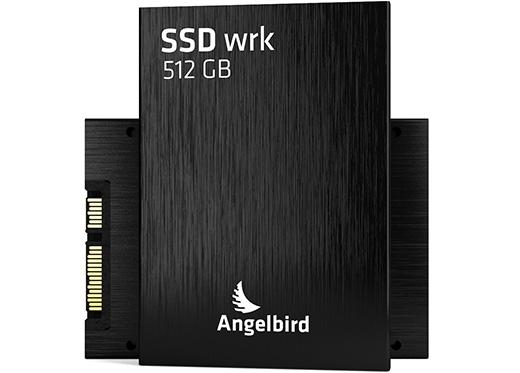
Many really good products come out of Austria, including KTM, Glock, and Noctua (my favorite CPU cooling company). Now, a small SSD company wants to add their name to the list, Angelbird. Angelbird cut its teeth in Germany, the second largest consumer SSD market. The company built a strong reputation there for first-rate build quality and innovative products. In the U.S., the Angelbird name really doesn't mean much to those outside of the SSD enthusiast crowd. Well, that's about to change.
Angelbird has secured accounts with North American e-tailers NCIX and B&H. While not exactly Tiger or Newegg, it's a place to start. I remember when Noctua went through the same growing pains, and now every e-tailer wants to carry the Noctua brand. Angelbird has also collaborated with our favorite SSD proprietor in Australia as well, Rod from RamCity, to carry the Angelbird product line.
Today we're looking at the Angelbird SSD wrk. This is the company's first large-scale, worldwide release; so far, everything is going really well. Angelbird sent several review samples out at the same time, and the company already has ten glowing awards on the official product page. We are probably the last to publish a review for this product, and for good reason.
Our first experience with a 512GB Silicon Motion SM2246EN controlled SSD started at Computex in June. The drive was a Fujitsu F100 we ran some early tests on. Just a few weeks back, we published a review of the Corsair Force LX 512GB, another SM2246EN controlled SSD. In between, we tested several 256GB models with the same controller. The stack of SM2246EN drives all performed really well in our notebook battery life test, so good in fact that they compare well to Samsung's power sipping SSDs.
The Angelbird SSD wrk was the exception. We fiddled, poked, and prodded before reaching out to Angelbird, and within a bit of time the company disclosed a small firmware issue that effects notebook battery life. A new firmware is in the "wrks" (I had to use that somewhere in this review) and should be available soon. Instead of holding our review for another month, we're going to go ahead and let this one fly as is, and then circle back with an update on power when the new firmware lands in our inbox.
Specifications, Pricing and Availability
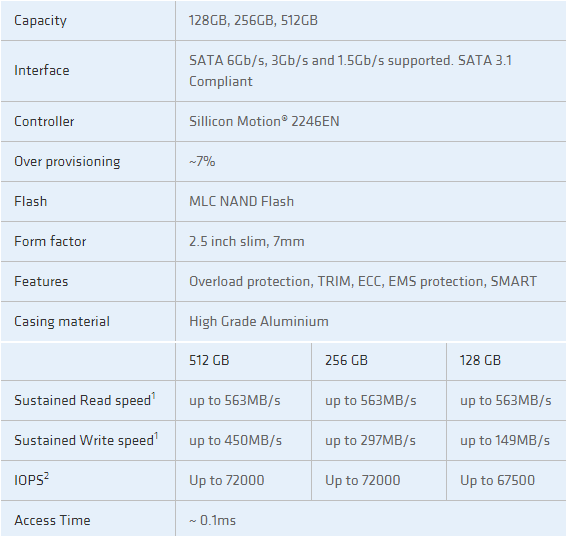
Angelbird released the SSD wrk in three capacities, 128GB, 256GB, and the model we're testing today, 512GB. At the heart of each drive is a Silicon Motion SM2246EN controller, and 20nm MLC flash. The 512GB model we're testing today clocks in with 563 MB/s sequential read performance, and 450 MB/s sequential write performance. All three capacities have the same read speeds, but the write speeds taper off with the capacity. Angelbird quotes random IOPS performance of up to 72,000, and the access times of 0.1ms.
Several companies make SSDs with the Silicon Motion SM2246EN controller, but no one makes them as pretty as Angelbird. The SSD wrk comes in a black, brushed aluminum housing with cream-colored accents on the top and bottom sides of the drive.
Angelbird prides itself on quality, and nothing backs that claim up better than a nice long warranty. The company backs the SSD wrk with a five-year warranty, which is the longest warranty that we know of for a value based SSD using a Silicon Motion controller today. Speaking of value, the 128GB model costs just $99.99 at B&H at the time of writing. The 256GB model is $159.99, and the 512GB model we're testing today is just $299.99.
At first, it doesn't seem like the retail SSD wrk includes an accessory package at all. Inside of the box, you get the retail drive and a code on a card. However, the code allows you to download three pieces of software from Angelbird's website, including System Reflection, a back-up software; Parallels Desktop, a virtualization suite; and Pure Mix, a video tutorial software.
Angelbird wrk 512GB SSD
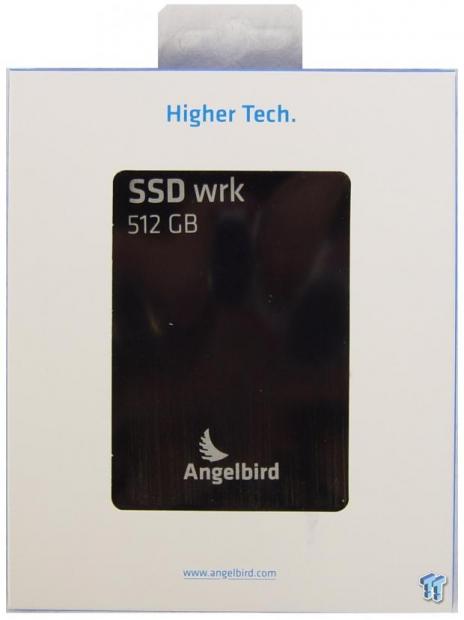
Angelbird took a minimalist approach to the retail packaging.
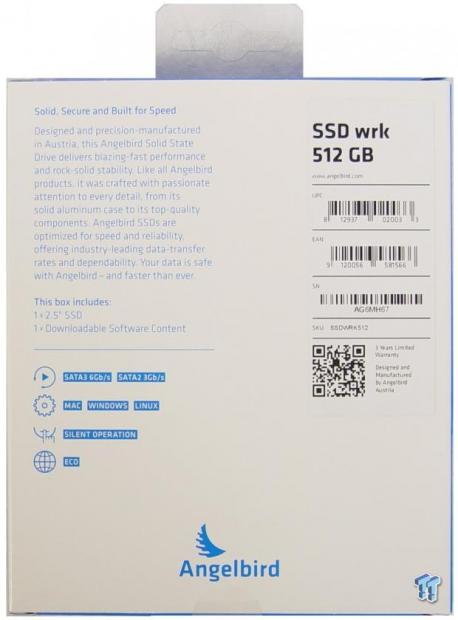
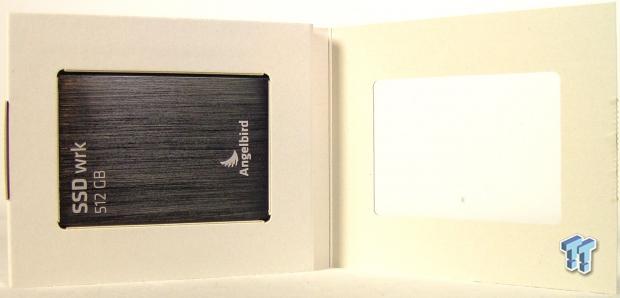
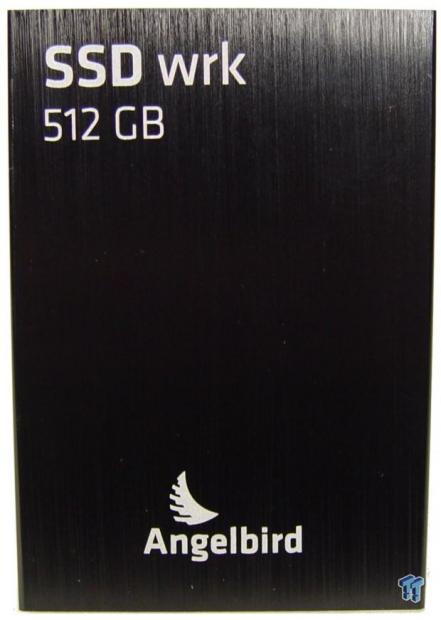
Here we get our first look at the Angelbird SSD wrk 512GB SSD. At the top you can see the brushing on the aluminum case, the whole drive has that texture, although it's difficult to photograph.
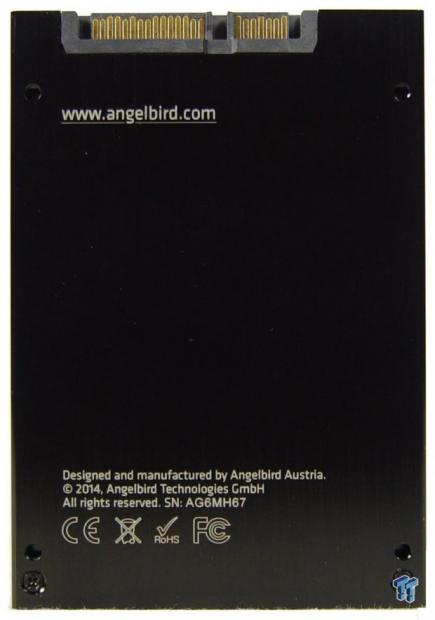

The SSD wrk is a 7mm z-height drive, so it will fit in your new ultra-thin Ultrabook.

I don't recommend you take your SSD apart, but Angelbird made it really easy for reviewers to crack the case open.
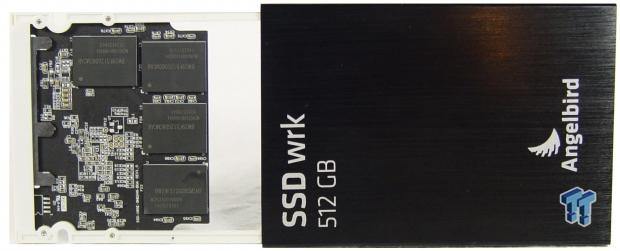
With two screws removed, the PCB slides out on rails. This is the first time we've run across a case like this, and it shows the level of detail put into the build quality.
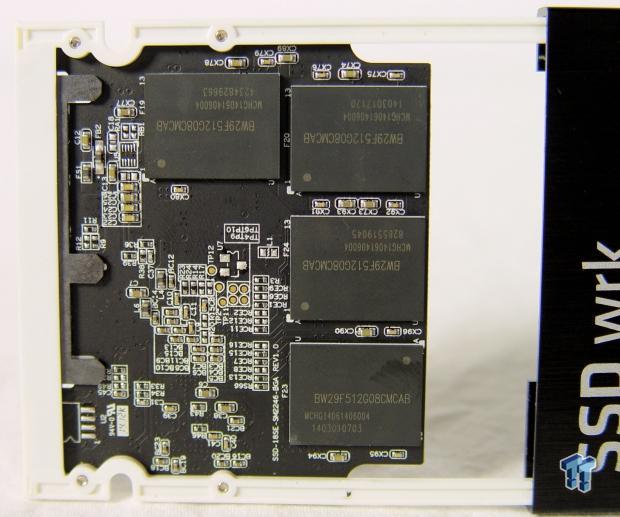
Although a majority of end users will never see the inside of their wrk, Angelbird took the extra steps to use a black PCB for the drive. This is the backside, were we also found four NAND flash packages.
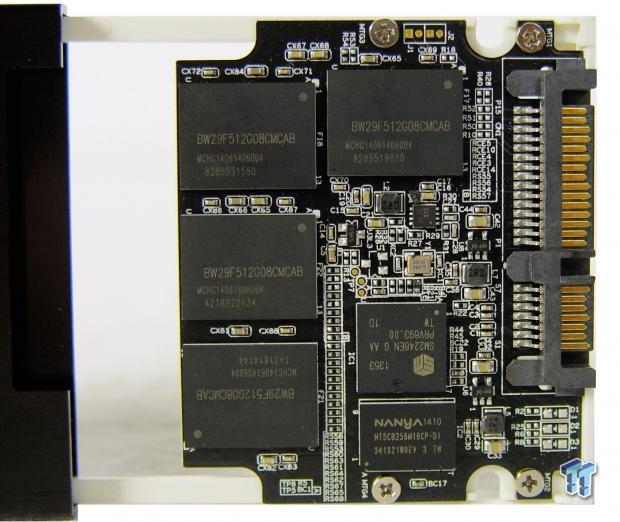
In the front, we found four additional flash packages, making eight total.
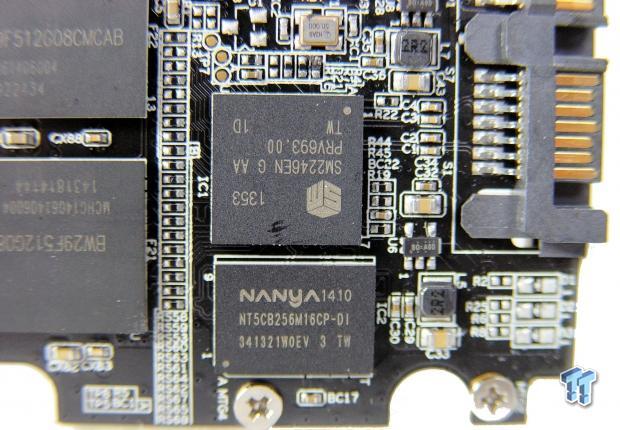
The controller is a Silicon Motion SM2246EN, and it's paired with 256 MB of DRAM for cache.
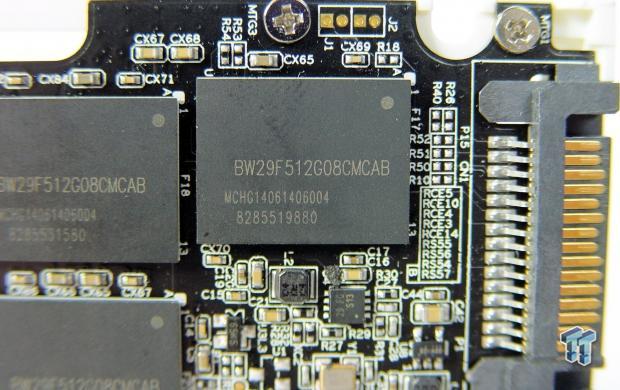
It appears Angelbird packaged NAND die, or went to Biwin to purchase IMFT 20nm flash prepackaged. The 29F512G08 could be either an Intel or Micron part number, Micron shows 26 components starting with 29F512G08CMCAB, but without the next set of letters, we can't look up the fine details on this flash.
Test System Setup and ATTO Baseline Performance
Desktop Test System

Lenovo T440 - Notebook Power Testing with DEVSLP and Windows 8.1 Pro
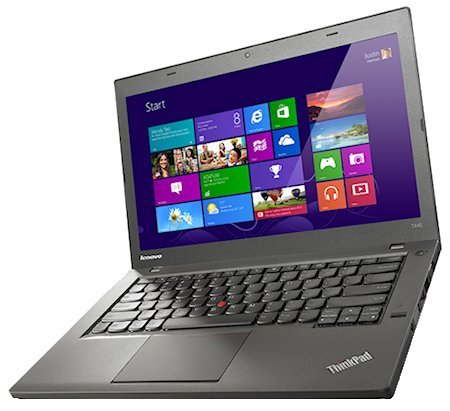
Nearly all of the performance tests run on the desktop system, but we use a Lenovo T440 to run the power tests. The T440 is the latest addition to our client SSD test lab, and allows us to test the notebook battery life offered by an SSD with advanced features like DEVSLP enabled.
ATTO - Baseline Performance
Version and / or Patch Used: 2.34

Angelbird's specifications were spot on with our initial test results. We achieved 563 MB/s sequential read, and 452 MB/s sequential write speeds in ATTO.
HD Tune Pro - Sequential Performance
Version and / or Patch Used: 5.50
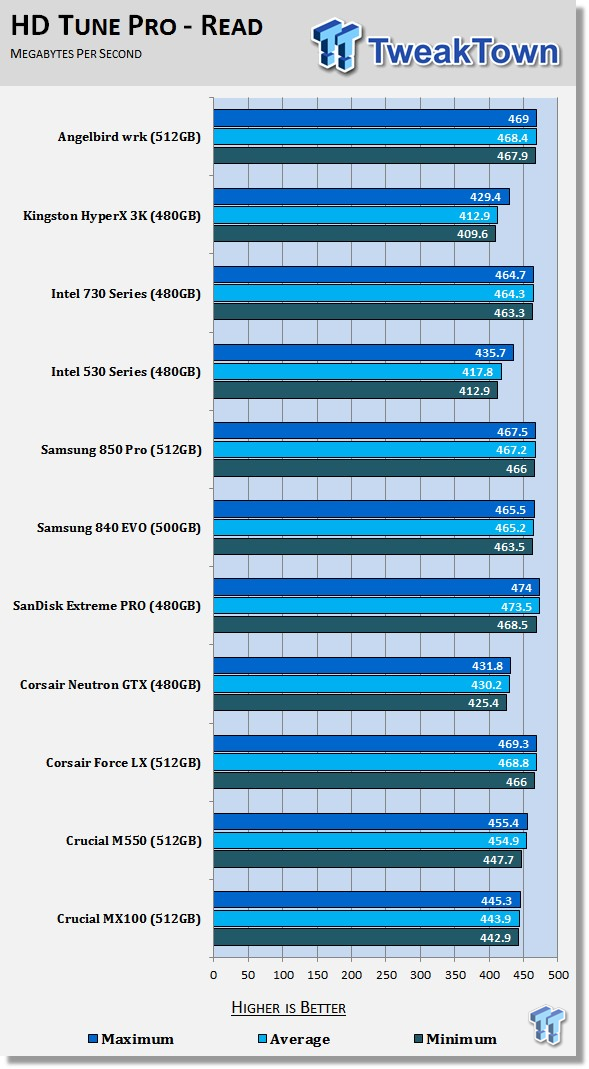
We've yet to stumble on a Silicon Motion controlled SSD that has trouble reading sequential data back at high speeds. The chart shows that most modern SSDs easily butt against the maximum SATA III levels. In this test, we use 64KB blocks instead of 128KB.
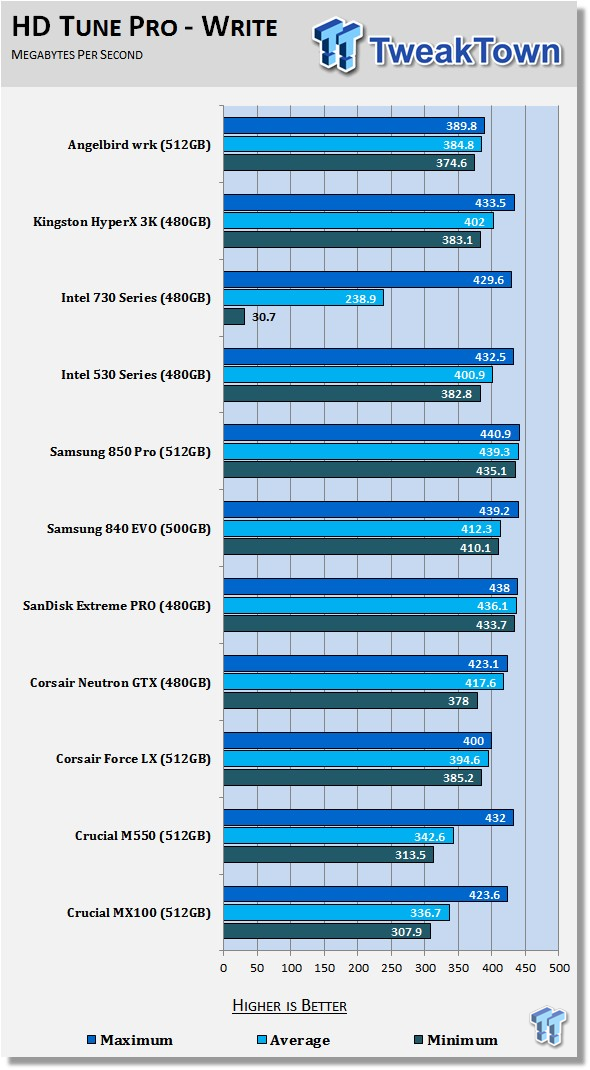
Here we see that write performance is what separates the value based and performance based SSDs. Although not as fast as the enthusiast class SSDs on the market today, the SSD wrk is far from slow.
In the introduction, we mentioned our previous test of the Corsair Force LX 512GB just a few weeks ago. On average, the SSD wrk delivered just over 40 MB/s more sequential write performance over the LX 512GB.
HD Tach - Sequential Write Performance after Random Writes
Version and / or Patch Used: 3.0.4.0
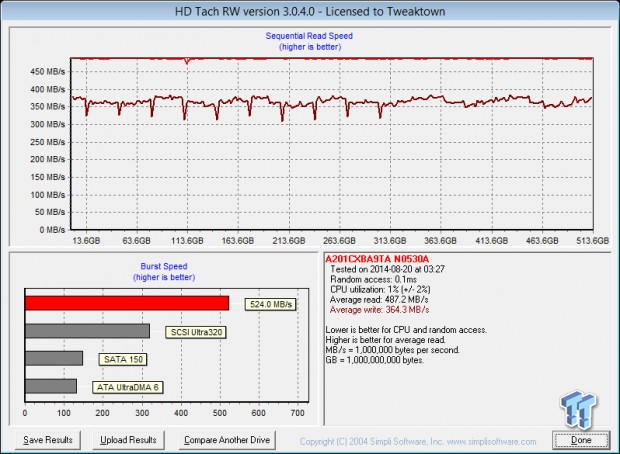
After a reasonable amount of sequential and random writes, we tested the SSD wrk in HD Tach with 128KB. This is precisely the real-world performance measurement we're looking for with the flash in a consumer steady state. The write performance drops down to an average of 364 MB/s, and doesn't have extreme performance drops like we've seen on some value based drives.
Benchmarks - Anvil Storage Utilities
Anvil Storage Utilities
Version and / or Patch Used: RC6
So what is Anvil Storage Utilities? It's a storage benchmark for SSDs and HDDs where you can check and monitor your performance. The Standard Storage Benchmark performs a series of tests; you can run a full test, or just the read or the write test, or you can run a single test, i.e. 4k QD16.
Anvil Storage Utilities is not officially available yet, but we've been playing with the beta for several months now. Anvil has been updating the software steadily on several international forums, and is adding new features every couple of months.
We can use Anvil several different ways to show different aspects for each drive. We've chosen to use this software to show the performance of a drive with two different data sets. The first is with compressible data, and the second data set is incompressible data. Several users have requested this data in our SSD reviews.
0-Fill Compressible Data
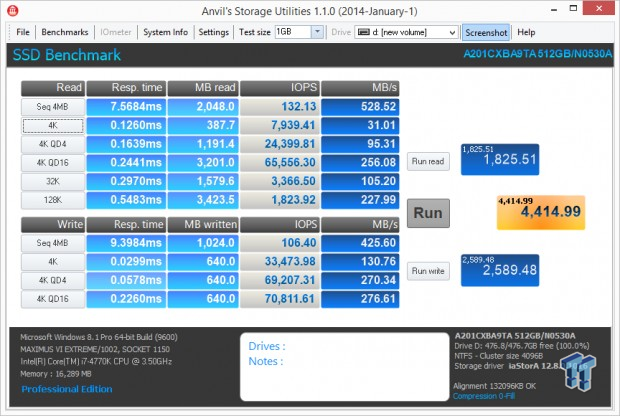
Incompressible Data
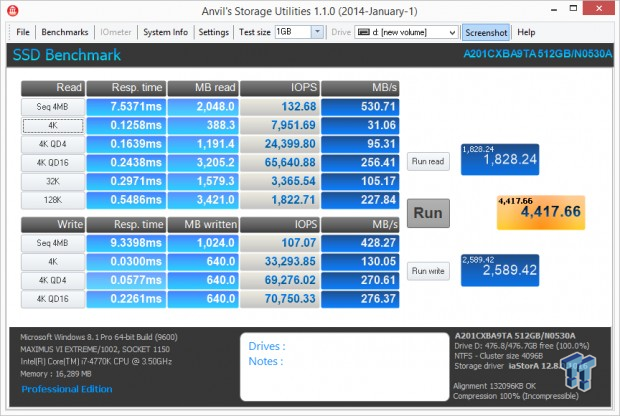
The performance with compressible data and incompressible data is the same, so you don't have to worry about performance loss while editing audio, video, or files that are already compressed.
Low Queue Depth Read IOPS
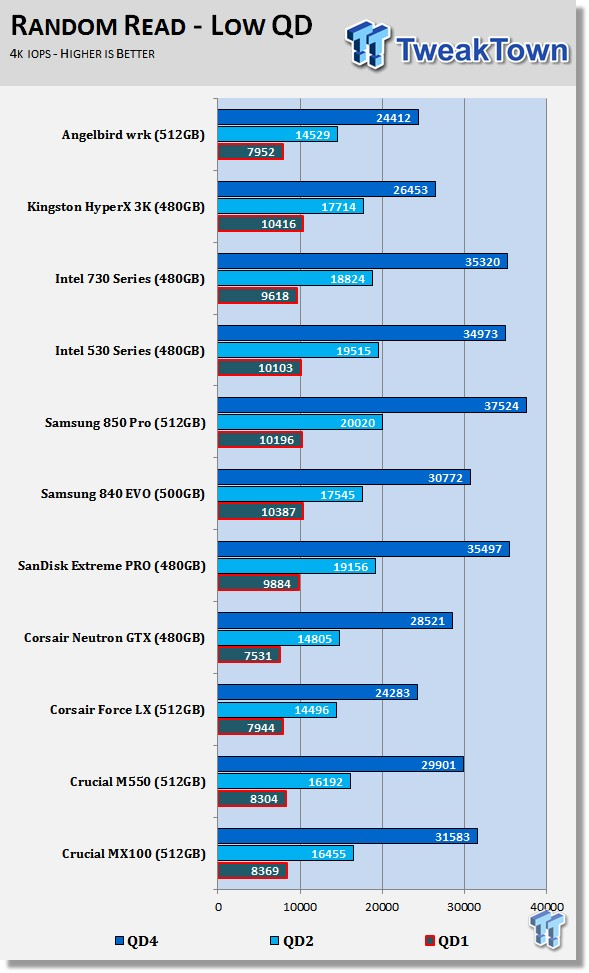
The low queue depth random read performance measured from the SSD wrk 512GB is nearly identical to that of the Force LX, the only other SM2246EN controlled drive on the chart today. We recently acquired two SandForce based 480GB capacity drives to get a well-rounded representation of value based performance products.
The Kingston HyperX 3K 480GB shares roughly the same price point as the SSD wrk, but the Intel 530 480GB costs $50 less. Both of these low-cost drives outperform the SSD wrk in low queue depth random read performance.
High Queue Depth Read IOPS
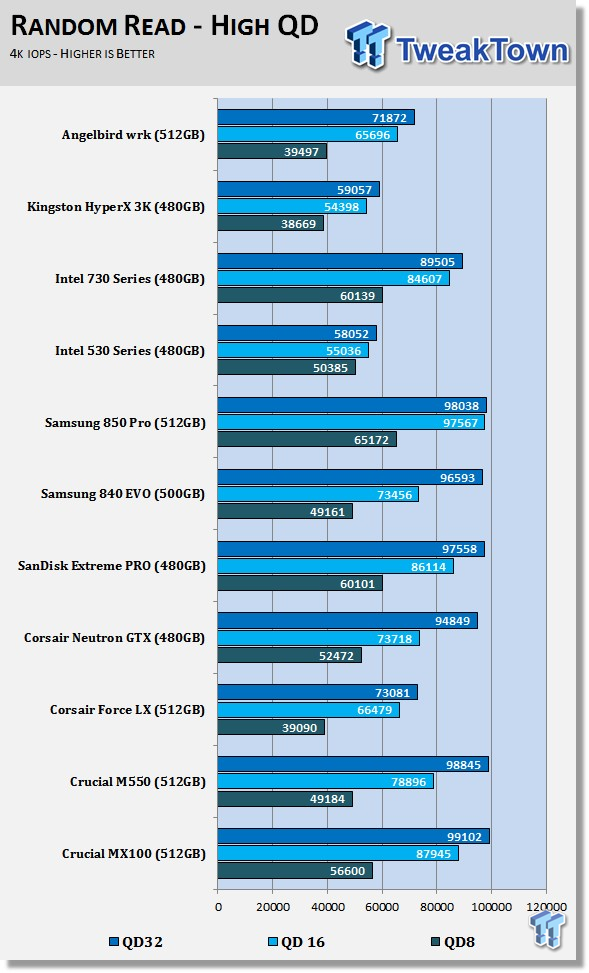
Most of us will never hit a high queue depth random read with a SSD. The drives are just too fast to have commands stacked this high under real-world conditions.
Low Queue Depth Write IOPS

The SSD wrk 512GB does performs well with random write data. Here you can see a threefold increase in the QD1 write performance over the SandForce based drives. The SSD wrk scales really well when the commands are stacked.
High Queue Depth Write IOPS
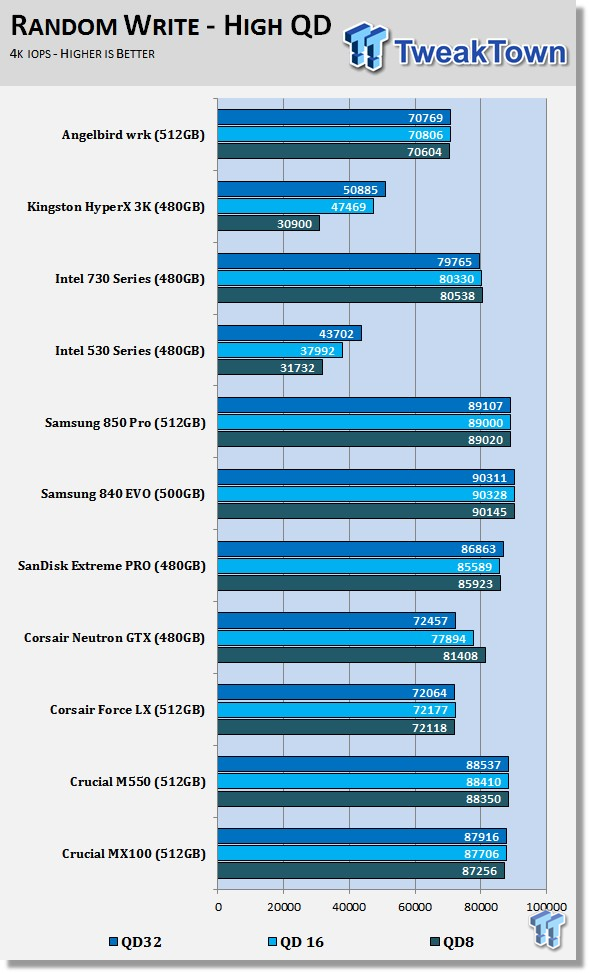
It's easier to get to high write queue depths than it is high read queue depths with SSDs. The SSD wrk 512GB tops 70K IOPS in these tests.
Benchmarks - Mixed Read / Write Workloads
Sequential Mixed Read / Write Workloads
In this series of tests, we measure mixed workload performance. We start with 100% read, and then add data writes to the mix in 10% increments until we get to 100% writes. We believe this will be the next major area SSD manufacturers will address after performance consistency.
Sequential Mixed Workload Bandwidth
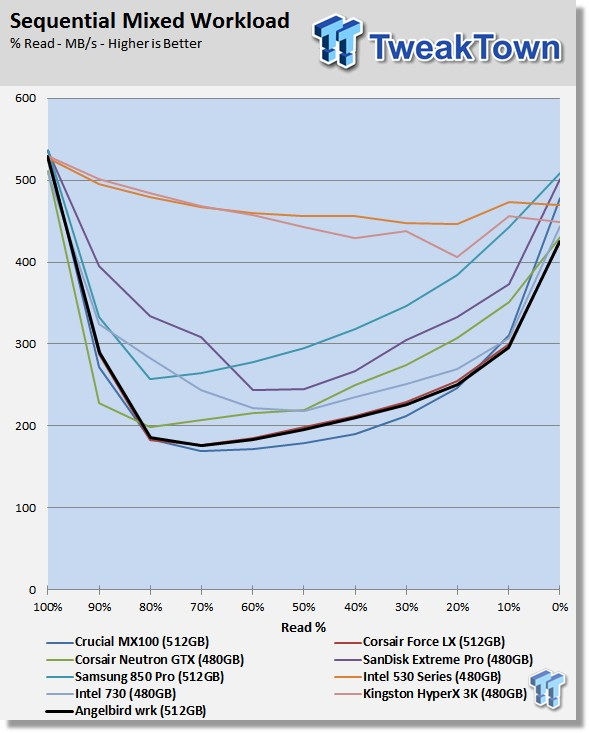
One area where most value SSDs have problems with performance is with mixed workloads. Although faster than a hard drive, many value based SSDs slow significantly while multitasking with heavy IO workloads. This is actually an area that SandForce spent a lot of time optimizing, but where the SM2246EN does poorly.
Sequential 80% Read / 20% Write Bandwidth
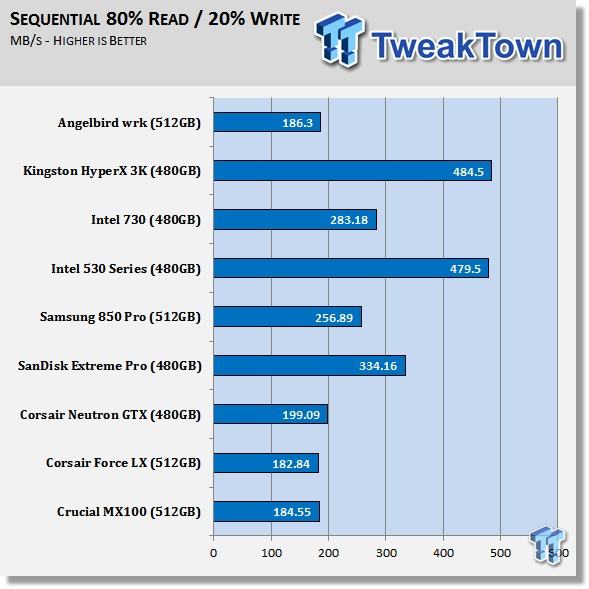
The general consensus is that 80% read to 20% write is the optimal measuring point for consumer workloads. Here we see the 80/20 mix for each of the drives on the chart.
Random Mixed Workload Response Time
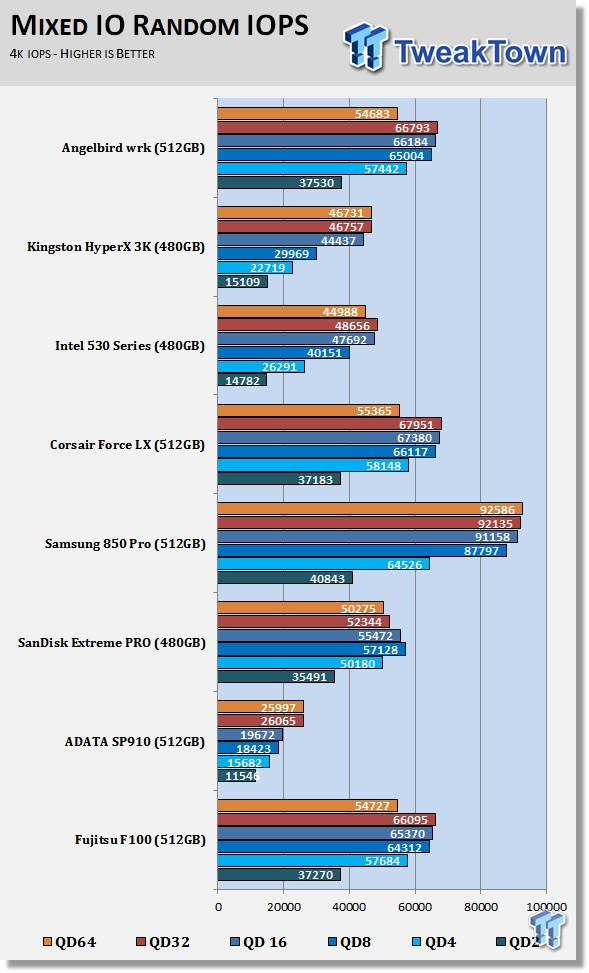
On this chart, we see the random mixed IO workload. This chart shows a 50/50 read write mix. In this test, the Angelbird SSD wrk actually does very well, as do the other SM2246EN controlled drives.
PCMark 8 Consistency Test
Futuremark PCMark 8 Extended - Consistency Test
Version and / or Patch Used: 2.0.228
Heavy Usage Model:
Futuremark's PCMark 8 allows us to wear the test drive down to a reasonable consumer steady state, and then watch the drive recover on its own through garbage collection. To do that, the drive gets pushed down to steady state with random writes, and then idle time between a number of tests allows the drive to recover.
Precondition Phase:
1. Write the drive sequentially through, up to the reported capacity with random data.
2. Write the drive through a second time (to take care of overprovisioning).
Degradation Phase:
1. Run writes of random size between 8*512 and 2048*512 bytes on random offsets for ten minutes.
2. Run performance test (one pass only).
3. Repeat steps one and two, eight times, and on each pass increase the duration of random writes by five minutes.
Steady state Phase:
1. Run writes of random size between 8*512 and 2048*512 bytes on random offsets for 50 minutes.
2. Run performance test (one pass only).
3. Repeat steps one and two, five times.
Recovery Phase:
1. Idle for five minutes.
2. Run performance test (one pass only).
3. Repeat one and two, five times.
Storage Bandwidth
PCMark 8's Consistency test provides a ton of data output that we use to judge a drive's performance. Here we see the three states of performance for the select SSDs, which are light use, consumer steady state, and worst case.

The consistency chart for consumer applications shows three ratings, each depending on the workload you plan to run on your SSD. The blue bar is heavy write loads over time, the orange is typical loads over time, and the red is after a long idle time. We try to focus on the orange bars in the consumer reviews, but if you plan to do workstation like activities, then the blue bar is something to keep in mind.
The Angelbird SSD wrk is competitive with other products using Silicon Motion controllers, and even SandForce controlled drives in this capacity size. Price wise, the SSD wrk still have to compete with the likes of Extreme II, MX100, and ADATA's SP920.
Storage Bandwidth All Tests
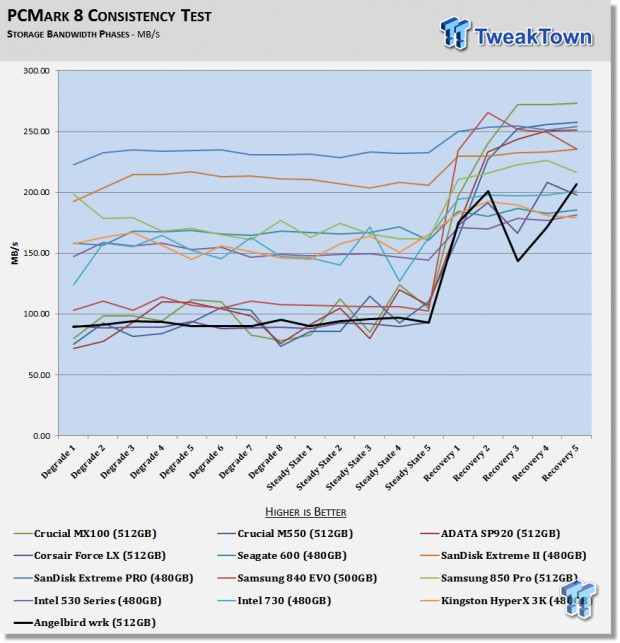
Heavy load really hurts the Angelbird SSD wrk 512GB. The performance suffers quite a bit after heavy use. The fact that the Extreme II 480GB now costs less than the SSD wrk 512GB, yet is the second best performing drive under heavy load in this capacity, doesn't help the SSD wrk's cause.
PCMark 8 Consistency Test - Continued
Total Access Time
The access time test measures the total latency across all 18 tests. This is one of, if not the most important of all tests we run at this time for consumer SSDs. When your latency is low, your computer feels fast; it's just that simple.
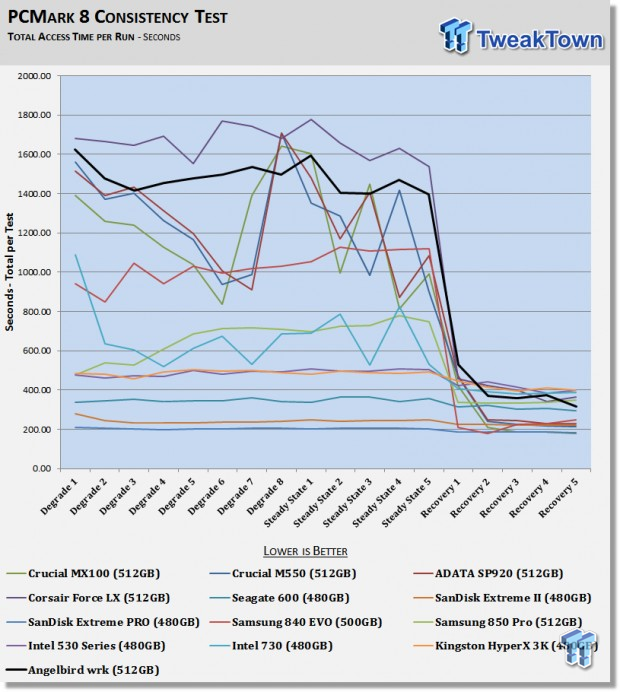
Although this chart looks similar to the previous chart, this one is more important in my opinion. This is actually one of the most important charts in the whole review. The latency of the subtests scores for each test group is shown here. The lower the latency, the higher the perceived performance of a drive to the user. Under heavy load, the SSD wrk shows a lot of latency, which would lead to a poor user experience, but the latency is tamed under lighter workload conditions.
Disk Busy Time
In the final test, we measure the amount of time the drive worked to read and write the data to complete the test. When a drive is active, it uses more power, so the faster it can complete the tasks, the faster it can fall into a low-power state.
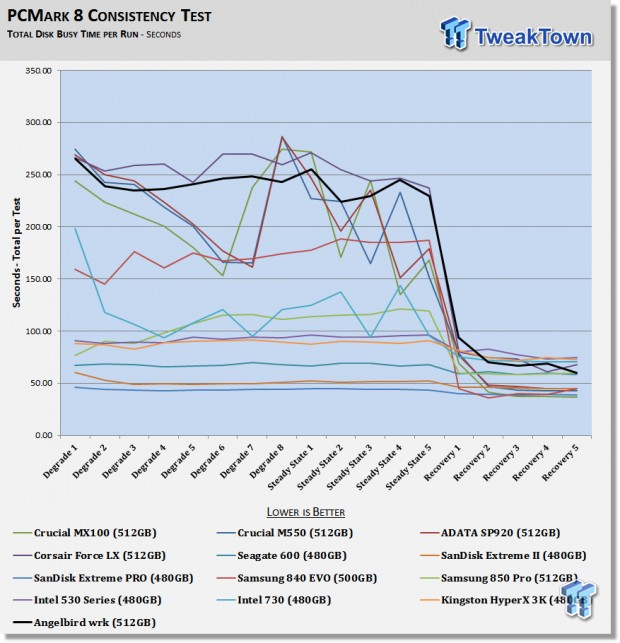
The Disk Busy Time chart doesn't add much more insight into the Angelbird SSD wrk analysis.
Benchmarks - Power Testing
Bapco MobileMark 2012 1.5
Version and / or Patch Used: 2012 1.5
Developer Homepage: http://www.bapco.com
Test Homepage: http://www.bapco.com
MobileMark 2012 1.5 is an application-based benchmark that reflects usage patterns of business users in the areas of office productivity, media creation, and media consumption. Unlike benchmarks that only measure battery life, MobileMark 2012 measures battery life and performance simultaneously, showing how well a system design addresses the inherent tradeoffs between performance and power management.
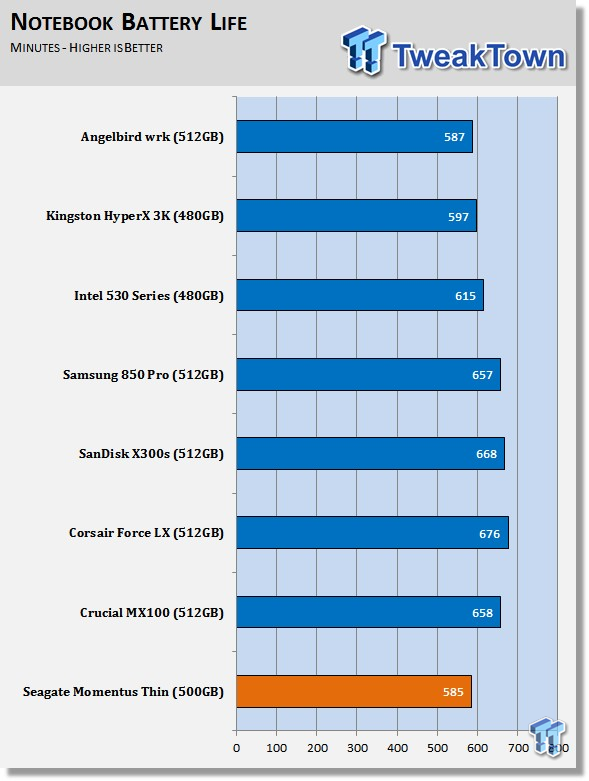
The Notebook Battery Life chart does add more insight to the analysis though. We discussed this in the introduction, but we will reiterate. At this time, the SSD wrk and it's release firmware only delivers two minutes more on time than a Seagate Momentus Thin HDD. We expected results in the same range as the Corsair Force LX 512GB. As mentioned before, Angelbird is working on a new firmware release that will fix the issue, but that this time, the SSD wrk is a poor choice for notebook users who run on battery power for long periods of time.
Power Limited Performance
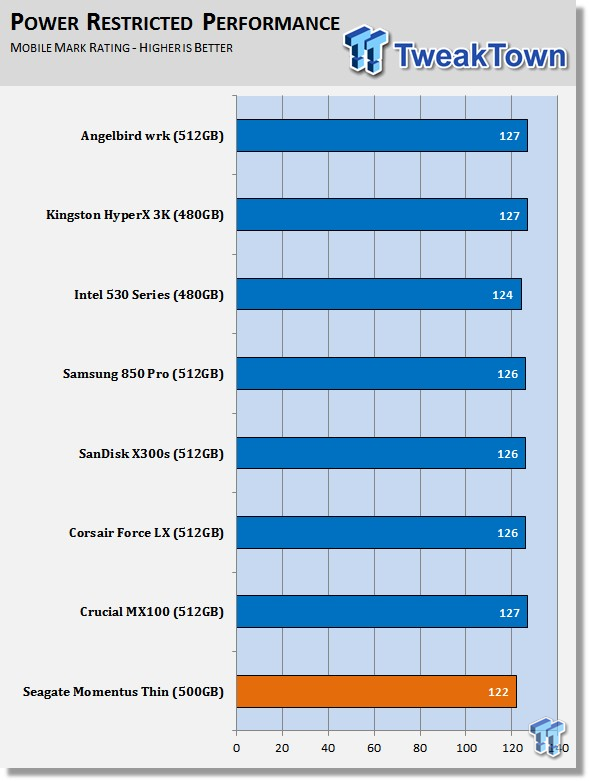
The performance of the SSD wrk 512GB in a power-limited state is in line with other SSDs. In this state, the CPU, DRAM, PCIe, and DMI busses slow to save power.
Final Thoughts
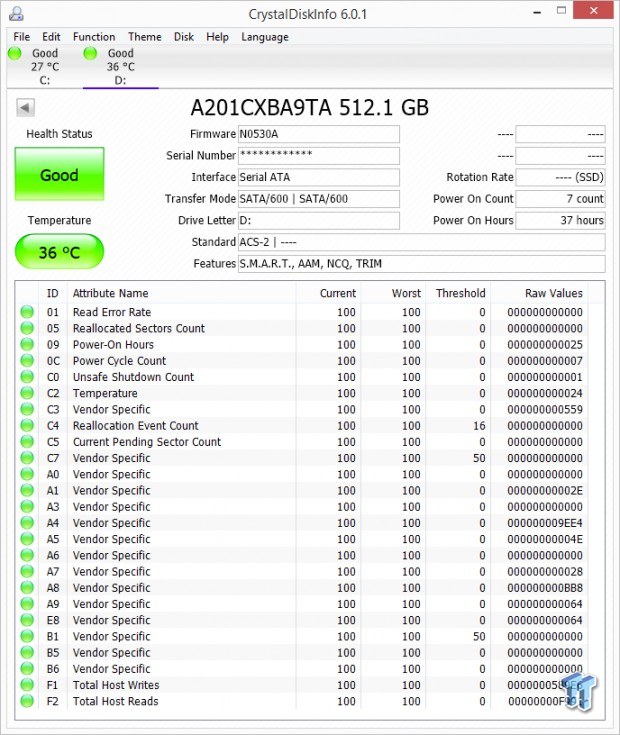
When all was tested, poked, and prodded, we had spent around forty hours with the Angelbird SSD wrk 512GB. We ran the drive though some additional tests as a boot drive with the operating system on it to get a real feel for what the SSD wrk is really like. Not long ago, we had done the same real-world tests and review tests with the Corsair Force LX 512GB. In that review, we concluded the Force LX in the large 512GB capacity size wasn't anything special. When it comes to performance, we have to say the Angelbird SSD wrk 512GB falls into that same category.
It's not that the SSD wrk 512GB is a bad SSD, it's just that there are other, better options. For twenty dollars more than the Angelbird SSD wrk 512GB costs, you can purchase the SanDisk Extreme II 480GB, which is the fastest SSD in this price range. When you're purchasing a 512GB capacity class SSD, there isn't much of a difference between $300 and $320. Eventually, the supply of Extreme II drives will dry up since it's entering EOL status, but it's the third fastest consumer SSD on the market right now, and every e-tailer has them in stock.
As stated, the Angelbird wrk 512GB isn't a bad SSD. The SSD wrk is actually one of the best-looking SSDs we've tested in recent time; it's in the same league with the original Kingston HyperX. The 512GB model has just 256MB of DRAM, and we don't think that's enough for the Silicon Motion SM2246EN controllers with this much flash. That's the same conclusion we came to with the Force LX 512G. When you put these drives under intense workloads, the latency goes sky high, and it's not a pleasurable experience. If you install a lot of games early on, and then use the drive for read intensive tasks like gaming, web browsing, and other normal tasks, the latency decreases as the drive's internal data management optimizes the data and cleans pages for new high speed writes.
There is still the issue with the power and how it affects notebook battery life left to be sorted. Silicon Motion is in charge of firmware development, and we know other SMI 512GB drives don't have the same issues we ran into with the Angelbird SSD wrk 512GB. Hopefully Angelbird can get a fix out soon for SSD wrk owners looking for better than HDD battery life.
Still, we really can't recommend this drive for most users. If you want a really good performance experience with a 300-350 dollar 512GB SSD, then the Extreme II is the best option. If you just want a good, low-cost 512GB SSD, then the Crucial MX100 512GB costs $209.99 at the time of writing. Anything in the middle is just a part number without a buyer. If Angelbird is able to get the price closer to the Crucial MX100 512GB, then we might have a different opinion, but right now, a similar performing drive costs nearly $100 less. That's nearly a third less, which is a significant amount we can't overlook.
| Performance | 80% |
| Quality including Design and Build | 93% |
| General Features | 83% |
| Bundle and Packaging | 87% |
| Value for Money | 83% |
| Overall | 85% |
The Bottom Line: Angelbird's wrk 512GB is a fantastic looking SSD, but it lacks high performance and costs more than products that perform about the same.
PRICING: You can find products similar to this one for sale below.
 United
States: Find other tech and computer products like this
over at Amazon.com
United
States: Find other tech and computer products like this
over at Amazon.com
 United
Kingdom: Find other tech and computer products like this
over at Amazon.co.uk
United
Kingdom: Find other tech and computer products like this
over at Amazon.co.uk
 Australia:
Find other tech and computer products like this over at Amazon.com.au
Australia:
Find other tech and computer products like this over at Amazon.com.au
 Canada:
Find other tech and computer products like this over at Amazon.ca
Canada:
Find other tech and computer products like this over at Amazon.ca
 Deutschland:
Finde andere Technik- und Computerprodukte wie dieses auf Amazon.de
Deutschland:
Finde andere Technik- und Computerprodukte wie dieses auf Amazon.de
Similar Content
Related Tags
